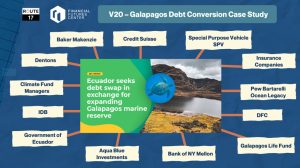Prior to the pandemic, Africa had begun to experience a slowdown in economic growth, and COVID-19 has only worsened these adverse trends. What is more, the pandemic also struck at a time when Africa was making slow and uneven progress towards achieving the 2030 United Nations Sustainable Development Goals (SDGs), with the continent already under various forms of climate-related stress such as floods, droughts and locust invasions.
A new technical paper from Njuguna Ndung’u and Abebe Shimeles of the African Economic Research Consortium (AERC) and John Asafu-Adjaye of the African Center for Economic Transformation (ACET) seeks to analyze the macroeconomic impacts of climate change in Africa and discuss the implications for policy. This paper is part of a series of new research from the Task Force on Climate, Development and the International Monetary Fund.
The authors explore three scenarios: impacts of climate change on agriculture, impacts of climate and the African Continental Free Trade Agreement (AfCFTA) and impacts of climate, the AfCFTA and innovation-led green recovery.
Using empirical modeling tools, they show that climate change will have a devastating impact on African economies, where increases in temperatures will fuel inflation with further negative implications for food security and poverty. Yet, while the outlook appears grim, the authors argue the COVID-19 pandemic can be an opportunity for Africa to launch a green innovation-led recovery that would not only speed up growth, but also simultaneously address climate change and other environmental issues that threaten Africa’s future.
Key policy implications:
- The AfCFTA, effective as of January 1, 2021, provides an opportunity for African countries to kickstart their economic recovery given the pandemic, though adverse environmental impacts of the AfCFTA should be mitigated through climate-smart agriculture (CSA) and other technological innovations.
- CSA, such as new crop varieties to tolerate heat and integrated pest management, would leverage innovation for improved farming practices, increased productivity and profitability on farms. However, to promote CSA among highly scattered, heterogeneous smallholder farmers, African governments should strengthen national agricultural research and extension systems to provide information on localized CSA practices to farmers.
- African governments should also build the requisite infrastructure and ecosystems to support adoption of digital agriculture technology. Reducing supply-side barriers includes improving low rural network coverage and increasing farmers’ access to digital applications. Demand-side measures include improving farmers’ skills and knowledge.
- Central banks should pay attention to climate-induced supply shocks, most notably temperature-related shocks, to create appropriate policy responses when forecasting inflation and other macroeconomic variables.
- Central banks should also consider green climate financing and green quantitative easing to help address climate impacts.




